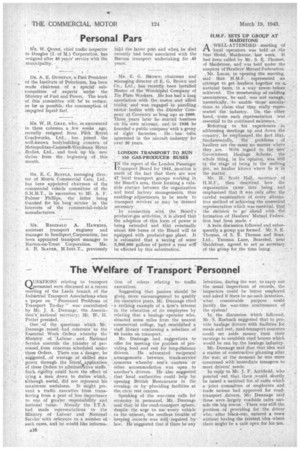The Welfare of Transport *Personnel
Page 18

If you've noticed an error in this article please click here to report it so we can fix it.
nUESTIONS relating to transport 14-.personnel were discussed at a recent meeting of the Leeds branch of the Industrial Transport AsSociationa when a 'paper on "Personnel Problems of Transport To-day " was contributedby Mr. J. A. Dunnage, the Association's; national secretary; Mr. W. H.
• Potter presided.
,. One ;of the questions which Mr. . Dunnage raised-had reference' to the Essential Work Orders whereby the Ministry of Labour. and. National Service controls the transfer of per; sonneTfrom concerns scheduled under those Orders. There was a-danger, he' • suggested, :of wastage .of skilled man
. power through the literal application of these Orders to adminstfative staffs,' Such, rigidity could have the effect of • tying a man down to duties which, although useful, did not represent his maximum usefulness. It might prevent 'a traffic. executive from transferring from a post of less importance to one . of greater responsibility and national value. Already the LT.A. had made representations to The Ministry of Labour . and National Service with refeeence to a number of such cases,. and he would like informa (ion of others relating totraffic executives,
Suggesting that juniors should be given, more encouragement to qualify for-executive posts, Mr. Dennage cited a striking example of a firm's interest in the education of its employees by relating that a haulage operator who, Situated some miles from the nearest commercial college, had. established a staff library containing a selection of 60 books on transport. ,
Mr. Dunnage had suggestions to offer for meeting the problem of providing food and rest for long-distance drivers. He advocated reciprocal • arrangements . between trunk-service concerns whereby one's canteen or other . accommodation was open to another's drivers. He also suggested that local authorities could help by opening British Restaurants in the evening, or by pfoviding facilities at the civic rest centres.
Speaking of the war-time calls for economy in personnel, Mr. Dunnage said that in the road-transport sphere, despite the urge to use every vehicle to the utmost, the needless trouble of keeping records was still, required by law. He suggested that if there beany intention, during the war, to carry out the usual inspections of records, the inspectors could be better employed and asked if there he no such intention, what conceivable purpose could justify the war-time .continuance ofthe system? .
In the discussion which followed, Mr. S. Roebuck suggested that to provide haulage drivers with facilities for meals and rest, road-transport concerns could set aside money from . their earnings to establish road houses which would be run by.the haulage indastry.
Mr. Dunnage said that that idea wai a matter of constructive planning after the war: at the moment he was more concerned with iminediate measpres to meet drivers' needs.
In reply to Mr. F. Archbold, who pointed out that there ,wquld shortly be issued a national list of cafés which a joint committee of employers, and trade unions had approved for roadtransport drivers, Mr: Dunnage said these were, largely roadside cafés outside the big towns. There was still -the 'problera. •of providing for the driver who, 'after black-mit; entered a town without having the faintest idea where there might be a café open for his use.




















































